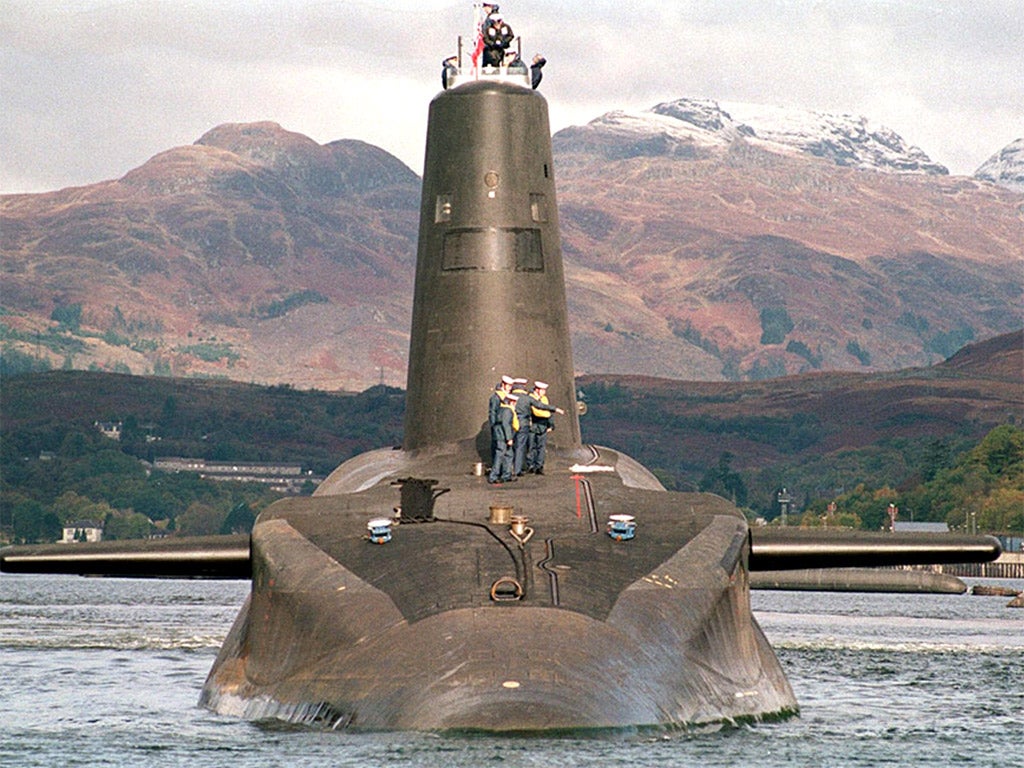Labour to join Tories in backing a £25bn deal to renew Trident fleet

Your support helps us to tell the story
From reproductive rights to climate change to Big Tech, The Independent is on the ground when the story is developing. Whether it's investigating the financials of Elon Musk's pro-Trump PAC or producing our latest documentary, 'The A Word', which shines a light on the American women fighting for reproductive rights, we know how important it is to parse out the facts from the messaging.
At such a critical moment in US history, we need reporters on the ground. Your donation allows us to keep sending journalists to speak to both sides of the story.
The Independent is trusted by Americans across the entire political spectrum. And unlike many other quality news outlets, we choose not to lock Americans out of our reporting and analysis with paywalls. We believe quality journalism should be available to everyone, paid for by those who can afford it.
Your support makes all the difference.Labour will fight the next general election on a pledge to retain Britain's independent nuclear deterrent, senior party sources have said.
Although some advisers to Ed Miliband want him to opt for a scaled-down, cheaper alternative to the current Trident system, there are growing signs that Labour will join the Conservatives in backing a £25billion "like-for-like" replacement.
Writing in The Independent, Lord West, the former Chief of the Naval Staff and Security Minister in the previous Labour Government, warns Labour not to abandon Trident in the hope of forging a coalition in 2015 with the Liberal Democrats, who oppose its renewal. Lord West argues the alternatives to the Trident fleet are unproven and would be more expensive, adding: "The British people will never forgive us if we get this wrong. What seems a seductive plan for Labour with a post-2015 coalition in mind is in fact highly dangerous." Mr Miliband wants Britain to retain an independent nuclear deterrent and backs multilateral rather than unilateral disarmament. But on becoming Labour leader in 2010, he made clear he has an open mind about what form the deterrent should take and stopped short of reaffirming the Labour Government's 2006 decision to renew the Trident system.
A Labour debate on the crunch issue is hotting up because Danny Alexander, the Chief Treasury Secretary, will publish the Liberal Democrats' review of the alternatives this spring. Although the Conservatives want to keep Trident, Mr Alexander believes there are credible alternatives to its continuous-at-sea deterrence in an age of austerity and a post-cold war world with an unknown enemy. They could include installing nuclear warheads on the current fleet of Astute submarines and cutting the number of boats from the current four to three or two.
Lord West, who was directly responsible for Trident as head of the Navy, believes such options are deeply flawed. But he is worried that Labour might be tempted into taking a decision based on short-term political calculations – building bridges with the Lib Dems – and making savings that would not materialise.
The Labour peer's intervention is aimed at ensuring that his party is not attracted by the menu of "soft options" he expects to be put forward in the Lib Dems' review. He is urging the Lib Dems to settle on a clear policy and wants Labour to ensure the alternatives to Trident are rigorously examined.
Officially, Labour is keeping its options open until Mr Alexander's review is published. A senior Labour source said: "Our final decision will be based on ensuring we have a credible deterrent, achieved in the most cost effective way and moving towards multilateral disarmament to reduce warheads and stockpiles. We are genuinely open-minded about how we achieve that."
Lord West's move will be welcomed by Labour MPs instinctively sympathetic to a like-for-like replacement for Trident, who include Jim Murphy, the shadow Defence Secretary. One Labour backbencher said: "The Lib Dems options may look superficially attractive to some influential people around the leadership. But they are a fallacy, an election tactic by a party that cannot win power on its own. The more people look at the 2006 decision [to renew Trident], the more it is seen as the right decision for the country."
The Lib Dems were allowed to pursue alternatives to replacing the Trident fleet when the Coalition put off the crucial decision on whether to renew it until 2016, the year after the next general election. Nick Clegg's party is determined to make Trident a key election issue. But the Tories' support for full Trident renewal would allow them to portray Labour as "soft" on safeguarding the nation's security if the Labour manifesto opts for an approach similar to that of the Lib Dems.
Join our commenting forum
Join thought-provoking conversations, follow other Independent readers and see their replies
Comments